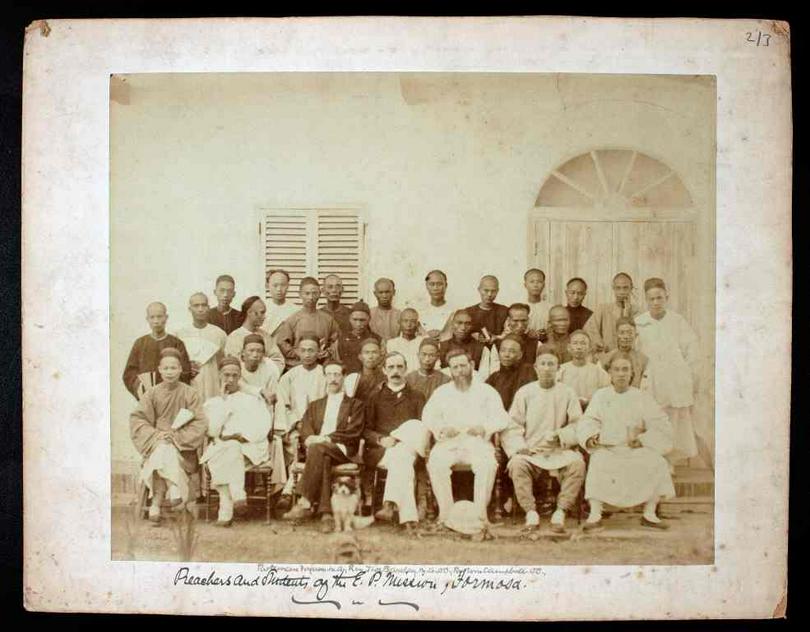Dr.William Campbell went to Taiwan to preach the Gospel for the English Presbyterian Mission. He was born in April 1841 in Glasgow, Scotland and studied at the University of Glasgow. After graduating, he continued to study theology in the Liberal Theological College for 4 years then he joined in the English Presbyterian Mission, going to Taiwan to preach not long afterward.
He arrived at Dagou, Taiwan on 10 December 1871, then went to Tainan. He also visited Parih in the middle of Taiwan and baptized believers in Aoran and Karehut, etc. He then set up a church in the White River in southern Chiayi in 1874, but some tyrants like Wu Zhigao stopped him from building the church as they believed it will damage the geomantic omen. On 29 January 1875, Wu Zhigao led over 40 thugs to burn church and dormitory, robbed money and even killed an innocent old woman. Faced with the dangerous situation of remaining in the area, Dr. William Campbell escaped with a quick invention and hid in the mountains, eventually surviving the threat. This event was called "the White River Event".
Even if faced with a terrible situation and there was a chance of being killed, Dr. William Campell remained to preach the gospel for Jesus. He went around Taiwan Pitou in the south, Freshwater in the North and Lin Qipu and Ga Malan in the east, leaving his beautiful steps and introductions to flourish. It is also worth mentioning that on 6 June 1886, he and Gaochangchuandai reached Hong Kong and started to preach in the Pescadores. Dr. William Campell also became the first priest of Penghu and gospel was planted in this beautiful place. Besides this achievement, he was very kind, especially when it comes to helping blind men. When he came in Taiwan, he found out that there were so many blind men because of gene complications, illnesses or accidents and there were a lot of blind men in Tainan. These blind men became beggers and had poor lives. So he returned England for a holiday and raise funds for these blind men. On October 1891, he rented a room in Hong Gongci of Taiwan (now Qicong Bo Aitang) and turned it as a school which was called Xun Gutang for the blind men for 5 years with a rent of 60 yuan every year.
It was the first school for blind men. When the contract expired, he went to Tokyo personally to persuade the Japanese government to take over the school. In 1900, the Japanese took over it formally and established a public school for blind men in addition, to founding the Tainan Ci Huiyuan blind education section.
Campell also studied the common braille that Taiwanese blind men used and composed Bible and books like "Braille Books for beginners" and the "Gospel of Matthew" for blind men. He often published information about caring for blind men in church magazines and appealed to more brothers and sisters to care these vulnerable members .
Dr William Campbell also worked a lot on learning different languages. He mastered English, Hokkien, Dutch and Japanese etc. and even composed the "Xiamen New Dictionary" with his special skill. The dictionary, which involved about 15000 characters with notes and usages in Vernacular, was published in July 1913. It was also called "Gan Dictionary" and have a high value about studying Hokkien. He alspo took part in the work of writing Taiwanese history. He collected historic records when the Dutch occupied Taiwan and wrote history books like "An Account of Missionary Success in Island of Formosa" and "Formosa under Dutch".
Dr. William Campbell often went to preach in the aboriginal residential area in the middle of Taiwan. On May 16, 1873, he and his co-workers reached the Water Tribe and found a wide and lovely lake, feeling refreshed and at peace. He called it the "Gan Zhishi Lake", which is the first priest's name in Taiwan. The lake is also known as the famous Sun Moon lake. He became the first person who found it.
The missionary served in Taiwan for 46 years and devoted his life to this breathtaking treasure island. When he left Taiwan, he was already 76 years old. In 1921, he rested in peace in England at the age of 80.
Translated by 水墨涵














